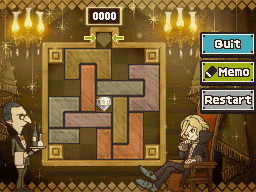petran79
Banned
.
Puzzles have a solution. That game is just different shaped blocks falling faster and faster. The Professor Layton series is an example of what I consider a real puzzle game. You are given lots of different puzzles to solve. Tetris and games like it belong in the genre with games like Breakout and Arkanoid. And those aren't puzzle games.
Blocks in this version fall at the same speed,but you have a time limit. It becomes like a guessing game and you get your chances. Also Layton's puzzles are so many that a lot of games also involve block puzzles similar to this game. A very hard one too. Could not solve it.

Tried doing the similar puzzle mode in Cleopatra Fortune few years ago and stuck at challenge 37. Cannot find any online info or walkthrough either. Game is that popular


